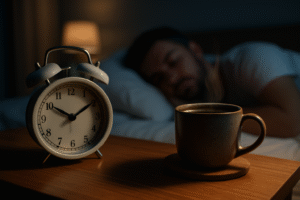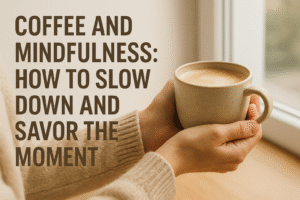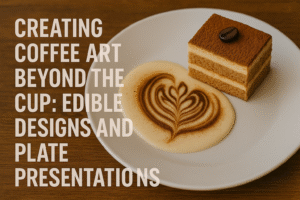Coffee is often seen as a pick-me-up, a way to energize the body and sharpen the mind.
But beyond alertness, many people report feeling happier, more motivated, and emotionally uplifted after their daily brew. Is it just the caffeine talking—or is there real science behind coffee’s ability to improve mood?
In this article, we’ll explore how coffee affects brain chemistry, how it influences emotional well-being, and what the latest research says about its connection to happiness, motivation, and even mental health.
Caffeine’s Impact on Mood and Brain Chemistry
The main active compound in coffee, caffeine, works by blocking adenosine receptors in the brain. This reduces feelings of drowsiness and increases the activity of neurotransmitters like:
- Dopamine (linked to pleasure and reward)
- Serotonin (associated with mood stability)
- Norepinephrine (connected to focus and motivation)
These chemicals help regulate mood, energy, and emotional resilience. When caffeine stimulates their release, you may feel not just more awake—but also more cheerful and upbeat.
This neurological boost is why many people associate coffee with better mornings and brighter moods.
Studies Linking Coffee to Happiness
Several large-scale studies have found a connection between regular coffee consumption and positive mood states.
A study published in the Archives of Internal Medicine found that women who drank two to four cups of coffee per day were significantly less likely to experience depression.
Another analysis in Harvard Public Health noted that people who regularly drank coffee reported lower levels of life dissatisfaction and fewer signs of depressive symptoms.
While these studies don’t prove causation, they suggest that moderate coffee intake may offer protective mood benefits, especially when part of a healthy lifestyle.
How Coffee May Reduce Risk of Depression
Some researchers believe that coffee’s impact on mood may even extend to reducing the risk of long-term depression.
The proposed mechanisms include:
- Antioxidants in coffee may reduce brain inflammation, which is linked to depression
- Improved dopamine activity can help balance reward systems in the brain
- Caffeine’s alerting effects can counter fatigue and emotional lethargy
- Better physical energy may lead to more social interaction and activity, both of which support mental health
In short, coffee may contribute to mood health through both biochemical and behavioral pathways.
Coffee and Stress Relief
While coffee is often considered stimulating, it can also offer emotional comfort—especially when consumed in a relaxing environment.
The act of making and sipping coffee can provide:
- A grounding ritual in chaotic mornings
- A mental reset during stressful work sessions
- A calming pause that encourages breathing and stillness
These small emotional benefits help buffer against stress and promote calm—even if caffeine increases alertness.
To enhance this effect:
- Avoid multitasking while drinking coffee
- Sip slowly and notice the aroma, texture, and warmth
- Pair your coffee with a quiet activity like reading, journaling, or deep breathing
These practices combine coffee’s chemical benefits with the mental benefits of mindfulness.
Coffee and Motivation
Feeling low energy often leads to procrastination or lack of motivation. Coffee can help by providing a gentle push toward action.
Caffeine enhances motivation by:
- Increasing dopamine in the brain’s reward pathways
- Raising your ability to initiate and complete tasks
- Encouraging movement and alertness, even when tired
Many people find that coffee “gets them going”—not just physically, but emotionally. This boost can be especially helpful for tackling challenging projects or getting through sluggish afternoons.
Social Coffee and Emotional Uplift
Coffee is deeply tied to social bonding, and emotional well-being often improves with human connection.
Whether it’s a café meet-up, a morning chat with a coworker, or simply enjoying a cup with a partner at home, coffee provides:
- A shared moment of joy
- A sense of routine and belonging
- Comfort through conversation and presence
This social aspect adds another layer to coffee’s mood-enhancing effects. You’re not just drinking caffeine—you’re engaging with others, which is one of the strongest predictors of mental well-being.
Can Coffee Make You Anxious?
While coffee can improve mood for many, it can also have the opposite effect in some people, especially when consumed in excess.
Too much caffeine may lead to:
- Jitters or restlessness
- Increased heart rate
- Racing thoughts
- Irritability or mood swings
- Heightened anxiety symptoms
If you’re sensitive to caffeine or prone to anxiety, try:
- Drinking lower-caffeine blends or half-caff
- Avoiding coffee on an empty stomach
- Sticking to 1–2 cups per day
- Replacing afternoon cups with herbal tea or decaf
Learning your personal threshold helps you enjoy the emotional benefits without the stress response.
Coffee, Mood, and Sleep: The Connection
Your mood is directly tied to the quality of your sleep, and poorly timed coffee can disrupt this balance.
Caffeine’s half-life is around 6 hours, meaning that a 3 PM coffee may still affect your sleep at 9 PM.
Poor sleep can lead to:
- Irritability
- Mood dips
- Lack of emotional regulation
- Decreased motivation
To avoid this, create a personal caffeine cut-off time. For most people, 2 PM is a safe limit. If you’re highly sensitive, stick to morning cups only.
This way, coffee supports your mood without sabotaging your sleep.
Coffee and Mindfulness: Enhancing the Mood Effect
Mindful coffee drinking can deepen its positive emotional impact.
Try this simple mindful coffee exercise:
- Hold the cup and feel its warmth
- Inhale deeply, noticing the aroma
- Sip slowly, focusing on taste and sensation
- Breathe between sips, bringing awareness to your body
- Notice how you feel, without judgment
This practice transforms coffee into a moment of presence, supporting mental clarity and emotional balance.
When to Seek Alternatives
While coffee can support mood for many, it’s not a replacement for:
- Therapy or medical care for serious mood disorders
- Long-term lifestyle habits like exercise and nutrition
- Human connection, rest, and stress management
If you find yourself depending on coffee just to “feel okay,” it may be time to explore deeper wellness habits or speak to a professional.
Conclusion: Coffee and Mood Go Hand in Hand
Coffee isn’t just about staying awake—it’s about feeling good. With its effects on brain chemistry, mood regulation, and daily rituals, coffee can be a powerful tool for emotional well-being when used with care and intention.
By understanding how it works—and how to balance its use—you can make your daily brew a source of both comfort and joy, helping you face the day with clarity, calm, and a brighter outlook.

Marcio Luzardo is a coffee enthusiast and the voice behind Tudo Viraliza. With a passion for turning curiosity into practical knowledge, he shares easy-to-follow tips, guides, and insights to help readers enjoy better coffee every day. When he’s not writing, Marcio is exploring new brewing methods or diving into the rich stories that connect coffee to culture, lifestyle, and wellness.



